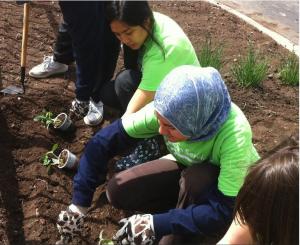
Interfaith Scholar Melanie Kulatilake shares a Buddhists’ perspective on life and the struggle our society faces, on how to branch out of the common notion to find our own truth.
Surrounding me is darkness with the shallow lights of the stars and my front porch lamp to guide me into the night. I walk down the steps and toward where my father is standing, looking out into the night sky with his long, cylindrical instrument. Beside my father is my older sister Nadeera. We both wait patiently for him to place the telescope just in the right spot for us to be able to gaze at the moon.
He finally placed the device in the right location so I could observe the moon up close. On my quest to view this magnificent site I was rudely interrupted by a little green creature. I screamed in fear from the unflattering tickle on my leg. My father shushed me and asked “What’s the matter?”
I replied in a whisper “A slimy bug jumped on me! Kill it.” My father looked at me with aggravation. “Stop over reacting! You got this stupid fear of bugs from your mom. They’re a hundred times smaller than you and in this area very unlikely to be dangerous.”
I huffed in frustration. How could my father say I was over reacting when a big green monster attacked me? What made me more infuriated was the fact that he hadn’t squashed this beast yet. “He’s gross and I want him dead!” I whined.
It was obvious he was upset with my tone. “Stop acting so childish! And if you want to kill him that’s your choice. You’ll have to do it yourself.”
That just flabbergasted me. How dare he not kill that bug for me; he was supposed to be my father, the one who protects me from danger. So that left me killing the bug myself. I lifted up my foot and slammed it down as fast as I could with not a hint of regret.
I left not even caring about taking one more peek at the moon. I just couldn’t believe how un-fatherly and stubborn my dad was being. And as I crawled in my bed all I could worry about was more bugs that could crawl on me and terrorize my beauty sleep.
That fear of insects and willingness to kill any of them within hindsight lasted until one day in my Buddhist class. I was sitting in class in my usual spot by my cousin Marlin and Nadeera. I was in the older class that consisted of high school and middle school students even though I was only in second grade at that time. Due to the fact that I was younger it was difficult for me to comprehend what the monk was teaching. The only reason I actually was in this class and not the class with kids my own age was because my favorite monk was teaching this class.
In my view, he is one of the nicest men who ever lived on this planet. He was always willing to answer my questions or listen to my stories. If he disagreed with one of my ideas he would always say it in a respectful matter, leaving me with not even an ounce of anger towards him. He was always considerate to the fact that I was younger than the rest of the students and would therefore speak simply for me.
So when this discussion of bugs was awakened I was very intrigued. He declared that “every living thing deserves to live including creatures that are very small.” I was even more shocked when he started to discuss how even mosquitoes (the most annoying bugs on this planet) deserved to live. He stretched out his arm as if a mosquito landed on him and said “next time a mosquito comes to try to suck your blood, let him. He’s a living thing just like you, trying to survive life’s hardships.”
Although my father told me several times to not squish insects, I never really cared to listen. Of course I loved my father and respected his insight, his words just didn’t mean as much in comparison to my monk (who I idolized for his kindness and patience). So when he spoke of his view on life, I actually considered it be valuable. I couldn’t believe that I never thought of bugs in this perspective before. I always thought of them as disgusting creatures that are not worth living. I never thought they were like cats, dogs, or even humans. The difference to me was that cats were cute and bugs were not. That’s what gave me the reason to believe that bugs deserve to die in comparison to all other living creatures. So does that mean an ugly human beings deserves to die because they’re not pleasant to look at? I am confident that most of society would disagree. So do bugs deserve die?
Relatively speaking, most westerners think differently than my dad or anyone else who was taught in this type of upbringing. The influence of my environment is another important factor for my fear of bugs. In the U.S. it is mostly taught that bugs are gross pests. Yet, in other countries they can be known as just another living creature like us or even food. It takes a brave person to ignore societies influence to decide on their own what they consider as right and wrong.
So today an ant crawled on my leg and instead of screaming and trying to kill him, I let him be. I imagined he whispered a “thank you” and went on with his life. I could have pulled the plug and ended his precious life but, now it just seemed monstrous. This brought me back to the day that my father said “if you want to kill him that’s your choice, you’ll have to kill him yourself.” I finally understood what my father was saying: “If you think bugs aren’t living creatures, then so be it. But don’t ask me to act upon your beliefs when they differ from mine.” He always tried to convince me what was right and wrong from a different perspective than the community that surrounded us. But, he never pushed me instead, he let me choose myself. It took me a while but I finally came to terms with his outlook on life and found myself believing the same as him. We are all living creatures, big or small, and we all deserve a chance at life.



